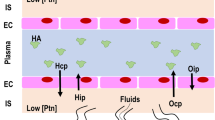Summary
Non-cardiogenic pulmonary oedema is one of the hallmarks in early acute respiratory failure. Release of inflammatory mediators in sepsis, pneumonia or after shock result in an increased pulmonary capillary permeability. Transvascular flux of macromolecules is increased. Transvascular fluid filtration is determined by microvascular pressure which is the result of left atrial pressure, postcapillary vas-cular resistance and cardiac output. A negative fluid balance is only effective in reducing transvascular fluid filtration when cardiac output decreases. Lowering cardiac output may result in splanchnic ischaemia and bacterial translocation and in acute renal failure. Thus, a negative fluid balance should be achieved only in patients with stable haemodynamics. Hypovolaemia must be avoided. Theoretical considerations and experimental studies suggest that crystalloids may be superior to colloids for volume replacement.
Zusammenfassung
In der Frühphase des akuten Lungenversagens verursachen inflammatorische Mediatoren eine Permeabilitätsstörung an der alveolo-kapillären Membran. In der Folge entsteht ein nicht-kardiales Lungenödem. Die alveolo-kapilläre Membran wird für Makromoleküle permeabel und der mikrovaskuläre Druck wird entscheidend für das Ausmaß der transvaskulären Flüssigkeitsfiltration. Determinanten des mikrovaskulären Druckes sind der linksatriale Druck, der postkapilläre Lungengefäßwiderstand und das Herzzeitvolumen. Die transvaskuläre Flüssigkeitsfiltration kann durch Negativbilanz nur dann effektiv verringert werden, wenn das Herzzeitvolumen sinkt. Die Abnahme des Herzzeitvolumens birgt die Gefahr der Splanchnikusischämie mit bakterieller Translokation und des akuten Nierenversagens. Deshalb darf eine Negativbilanz nur dann erfolgen, wenn der Kreislauf stabil ist und wenn eine Hypovolämie vermieden wird. Beim Volumenersatz scheinen kristalloide Lösungen Vorteile gegenüber kolloidalen Lösungen zu haben.
Similar content being viewed by others
Author information
Authors and Affiliations
Additional information
Eingegangen: 26. September 2001/Akzeptiert: 10. Oktober 2001
Rights and permissions
About this article
Cite this article
Benzing, A., Mols, G. & Geiger, K. Flüssigkeitstherapie beim akuten Lungenversagen. Intensivmed 38, 690–698 (2001). https://doi.org/10.1007/s003900170020
Issue Date:
DOI: https://doi.org/10.1007/s003900170020




